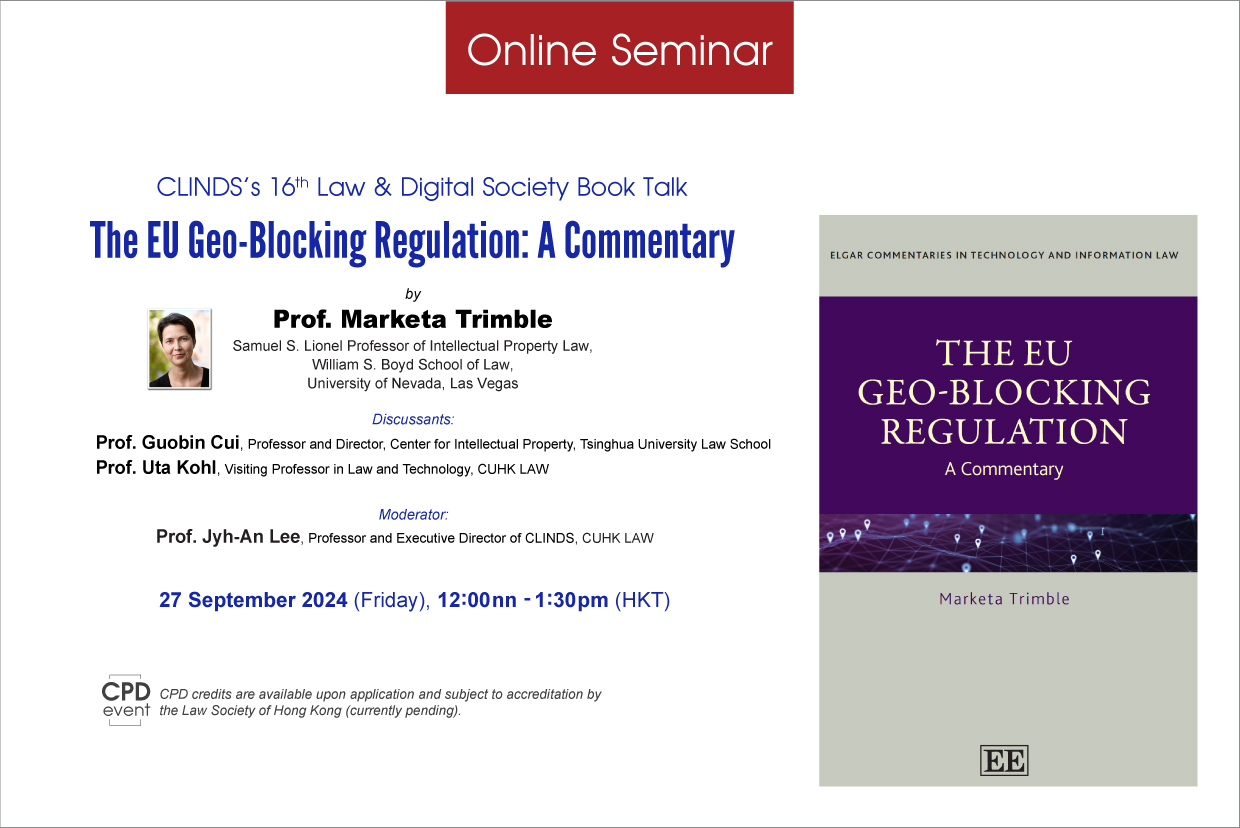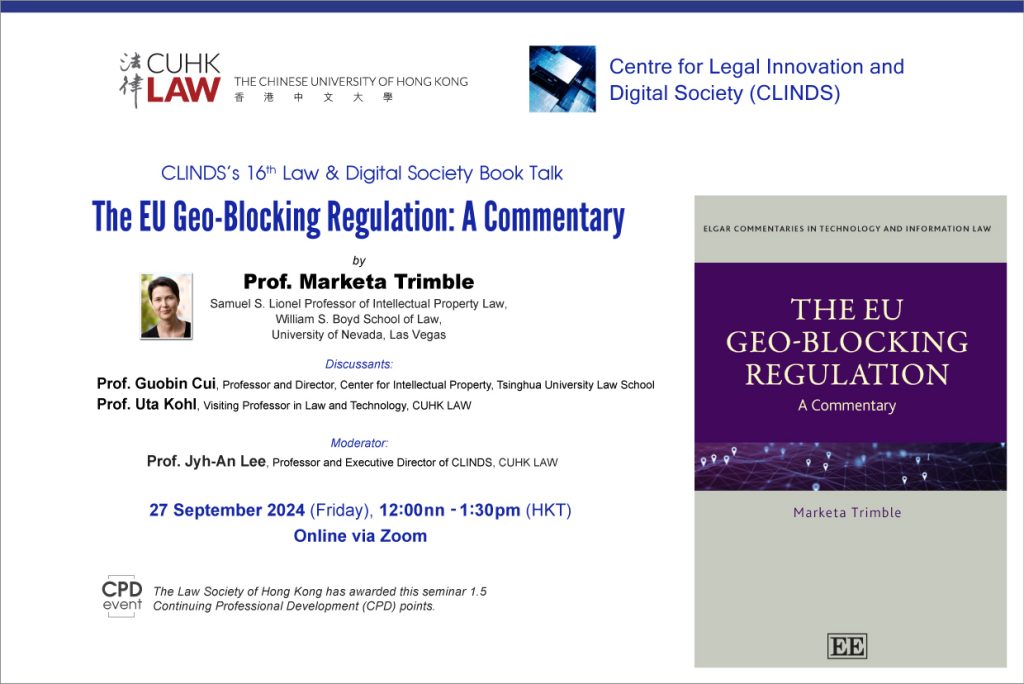This Commentary provides a detailed, article-by-article analysis of the 2018 EU Geo-Blocking Regulation. The Regulation affects customers in the European Union and businesses both inside and outside the European Union if the businesses serve or seek to serve customers in the European Union. All of the Regulation provisions concerning geo-blocking and other forms of customer discrimination are explained, including the provisions on non-discriminatory access to online interfaces, goods and services, and means of payment. Introductory chapters discuss the history, technology, uses, legality, and circumvention of geo-blocking, and detail the legislative history that led to the adoption of the Regulation. The Commentary also explores the relationship between geo-blocking and various areas of law, particularly copyright law and competition law, and it reviews the implementation and enforcement of the Regulation.
The book contains:
– A detailed, article-by-article analysis of the 2018 EU Geo-Blocking Regulation
– A history of the legislative process of the Geo-Blocking Regulation, including a discussion of the most contentious points in the process
– An overview of the history and development of the EU Digital Single Market project, which led to the adoption of the Geo-Blocking Regulation
– A summary of the first review of the Geo-Blocking Regulation by the European Commission and notes on the implementation and enforcement of the Regulation
– A detailed account of the history, technology, uses, legality, and circumvention of geo-blocking
– An analysis of the relationship between geo-blocking and several areas of law, particularly competition law and copyright law
About the Speaker:
Marketa Trimble is the Samuel S. Lionel Professor of Intellectual Property Law at the William S. Boyd School of Law at the University of Nevada, Las Vegas. She specializes in international intellectual property law and publishes extensively on issues at the intersection of conflict of laws/private international law and intellectual property law, particularly patent law and copyright law. She has authored numerous works on these subjects, including Global Patents: Limits of Transnational Enforcement (Oxford University Press, 2012), and is the co-author of a leading international intellectual property law casebook, International Intellectual Property Law (with Professor Paul Goldstein, Foundation Press, 6th ed. 2023). She has also authored works in the area of cyberlaw, particularly relating to the legal issues of geoblocking and the circumvention of geoblocking, including The EU Geo-blocking Regulation: A Commentary (Edward Elgar, 2024). She has presented at conferences in the United States and abroad, and teaches regularly in the Munich Intellectual Property Law Center, an academic center of the Max Planck Institute for Innovation and Competition. She is a member of the American Law Institute, the International Academy of Comparative Law, the American Society of Comparative Law, and other academic and professional organizations.
Discussants:
CUI Guobin is Professor as well as Director of the Center for Intellectual Property at Tsinghua University Law School. He was the Associate Dean for International Affairs and Academics (2016.7-2019.6). Professor Cui earned his Ph.D. in law, LL.M., and B.Sc. in Chemistry from Peking University, and his second LL.M. from Yale Law School.
His scholarly interests include intellectual property, antitrust, property, and law and economics theory. He teaches Intellectual Property Law, Patent Law, Advanced Topics on IP, IP Licensing, and Chinese Civil Law. He has published more than 30 law review articles and two popular casebooks, “Patent Law: Cases and Materials” (1st edition in 2012, 2nd edition in 2015) and “Copyright Law: Cases and Materials” (2014, Peking University Press).
Before he joined Tsinghua in 2002, he had practiced law in Beijing and Shanghai. In 2008, he worked as an intern for Judge Rader at the U.S. Court of Appeals for the Federal Circuit. He was a visiting scholar at the George Washington University Law School in 2008, the University of Chicago Law School in July 2012, the University of Washington Law School in May 2013, and the University of New South Wales (UNSW) in February 2018. In August 2020/2021, he was visiting associate professor/visiting professor at National University of Singapore (NUS) School of Law, teaching a course on Chinese Intellectual Property Law.
He also serves as adjunct researcher, the Center for Judicial Protection of Intellectual Property, the Supreme People’s Court of China; legal advisor, Beijing High People’s Court; specialist juror, Beijing Intellectual Property Court(2016-2020; and legal advisor, the People’s Court of Haidian District of Beijing.
Uta Kohl is a Professor of Commercial Law at the University of Southampton with research interests in the governance of the internet and technology as well as transnational corporations. She graduated from the University of Tasmania with a BA/LLB (First Class) and received a PhD in Law from the University of Canberra (2003).
Uta Kohl is the author of the monograph Jurisdiction and the Internet (CUP, 2007, ppb 2010) and the textbook Information Technology Law (5th ed, 2016, Routledge, with D. Rowland, A. Charlesworth). In 2013, Google Inc invited her to do further research on internet jurisdiction, which led to the symposium National Law versus the Global Internet – Re-Negotiating Westphalia? (2014) and the edited collection The Net and the Nation State (CUP, 2017). More recently, she has branched out into other online governance questions, like predictive analytics (see edited collection Data-Driven Personalisation in Markets, Politics and Law, CUP, 2021, with J. Eisler) and comparative privacy and hate speech regulation (see the funded Leverhulme project ‘Modern Technologies, Privacy Law and the Dead’). She also acted as the Human Rights Trustee on the Board of Trustees of the Internet Watch Foundation (2014-2020).
Uta Kohl has held various visiting positions, most recently as a visiting scholar at MIT (2023) in a collaborative project with Prof Nazli Choucri on corporate sovereignty on the internet.
*The Law Society of Hong Kong has awarded this book talk 1.5 Continuing Professional Development (CPD) points.


0 Comments